- Home
- Nick Carter
War From The Clouds Page 2
War From The Clouds Read online
Page 2
"He has told us repeatedly," Luis said when I had untied him, "that if we find any Americans interfering with our great cause here in Nicarxa we are to disembowel them and feed them to the pigs."
Even worse than Colonel Vasco's grimly-dedicated hatred of Americans were the solid military defenses he had arranged for the protection of Don Carlos and his fellow monks.
Alto Arete, Luis said, spilling his guts the way he had been instructed to spill American guts, was truly impregnable. The trail up the side of Mt. Toro was accessible only by ropes controlled from above. The gaps in the trail were the colonel's idea. He had dynamited them out to create immense chasms, and had established rescue stations above the points where the trail had been blown away.
From above, armed soldiers would ascertain if the traveler was welcome. If so, they would lower ropes and raise the visitor to the next level in the trail. If not, they would drop boulders on the poor sap. And the soldiers were so well hidden in their outposts above the trail that no firepower from below could unseat them.
Even before a traveler could start up the trail, he had to pass through a thousand Cuban Marines bivouacked in a base camp at the foot of Mount Toro. Security was tight here and, so far, no unwelcome visitor had made it past the Marines. Once, though, Luis told me, the soldiers at the first outpost — the first break in the trail — had mistaken a party of Nicarxan diplomats for the enemy and had crushed them all with boulders, then had emptied their Russian XZ47's into their wrinkled corpses.
If an unwanted visitor or enemy should penetrate the Marines and somehow make his way around the breaks in the trail, through bits of sharp metal impregnated with curare, that visitor would be greeted near the top of Alto Arete by a minefield. If he got through that in one piece, he would encounter a high metal fence charged with ten thousand volts of electricity. If, by some insane and perverse twist of reality, he should get over that fence without being fried to a crisp, he would be met by a hundred armed monks and vicious guard dogs infected with rabies.
Attack from the air was equally futile, even if I had access to a fleet of bombers or fighter planes. Computer-controlled antiaircraft guns rimmed the boundaries of Alto Arete. They had already destroyed the total air force of resisting guerillas and had shot down a number of private planes that had ventured near the sacred mountain column.
As if all that news wasn't depressing enough, Sergeant Pequeno went on to say that Don Carlos had plans to start a bloody revolution in just six days. The crazy monk, who was in constant radio contact with his agents in the capital, had arranged to have a group of Apalcan allies visit him on the mountaintop in a few days. If he gained their full support for his revolutionary ideals, he would signal the start of the war. His own guerillas, with the help of the Cubans, would annihilate all government resistance and would even kill the peace commission members already trying to work out a treaty between the two island countries.
After all the dust had cleared, Luis said, Don Carlos would be the undisputed chieftain of both island nations and would be surrounded only by fanatic believers. Together, under the leadership and guidance of these crackpots, Nicarxa and Apalca would commence a reign of terror, a crusade of conquests that could quite quickly lead the world into its third major conflict.
As far as I knew — and my information came directly from the President of the United States — I was the only American in Nicarxa. And I knew also that I was the only man outside of Don Carlos Italla's gaggle of crackpots who knew of his plans. In short, N3, Killmaster for AXE, was the only man who could stop Don Carlos. Unfortunately, I couldn't do it with the plans and weapons at my disposal. And I certainly couldn't do it if Sgt. Luis Pequeno walked free and told what he knew of me. I already had been exposed to his penchant for singing like a bird of everything he knew.
"Turn around, sergeant," I had said when Luis had finished his incredible tale. "Open the door to the horse's stall and go inside. I'm going to tie you securely and take your uniform. I have plans for it. You'll be safe here. Even the family you terrorized will feed you and bring you water."
There was a smile on the sergeant's face as he entered the stall. Pistola moved aside, her eyes glinting in the lantern light, afraid of this new incursion of her privacy. Luis was convinced of my softness, knowing that all Americans are soft and cannot summon the courage or the viciousness to do what must be done in a tough, troubled world. He felt safe because of that knowledge, and because he knew that his comrades would come by each night to see Elicia, and would free him.
I let those comforting thoughts rattle around in the sergeant's head for a time, feeling that it's bad enough to die with violence, much less with frightened and troubled thoughts. But my stalling wasn't mere stalling.
"One last favor, Sergeant," I said, taking out my notebook and a pen. "I want you to help me draw a map of the fortifications on top of Alto Arete. After that, I'll leave you to sleep and then Senor Cortez will bring you food. Will you help me?"
It took quite a while to get a suitable map drawn. I caught Luis in a number of lies, diversions from his original story, but I was finally convinced that the map was mostly accurate. I pocketed the notebook and pen, and got up. I walked around behind the Marine sergeant and slipped Hugo into my hand.
"I'll be leaving you now, Sergeant," I said softly.
He was turning toward me, a smile broadening on his face, when my hand leapt out and pressed the nerve juncture beside his neck at the top of his right shoulder.
He went instantly unconscious and I moved into the stall, Hugo in my hand. I plunged the stiletto through his ribcage, striking straight at the heart. He felt nothing and he died in a few seconds. I got a shovel and buried him in the stall. I buried him deep.
* * *
"Aaaiiii!
Elicia cried out in panic when I entered the house. She was still cradled in her mother's arms. She might have slept, fitfully, but now she was awake and the sight of the Marine's uniform sent her back to the depths of terror.
"It's all right," I said, hastily but softly. "It's all right, Elicia. I'm not the Cuban. I'm the man who saved you from him. I merely need his uniform."
Old Jorge and Melina were the first to come around. When they knew that it was me and not the burly Cuban, huge smiles spread across their wrinkled faces, revealing teeth that had never known a moment of dental hygiene.
"It is as he says, niña," the old man said to his daughter. "It is the good man, not the bad one. Where is — what have you done with the soldier?"
I told them. It would have been no good lying to them. Their eyes widened in horror and fright. I had to calm them.
"You don't have to worry about other Marines finding him," I said. "You'd have much greater worries if he were alive. Now, it's a certainty that his buddies will come here looking for him, and for Elicia. It's important that we get you all out of here, to some safe place in the mountains. I'll try…"
"No," Jorge said, shaking his old head vigorously. "Here is where I was born, here is where I will die. You take Elicia to my cousin's house in the hills. She can show you where it is. When the soldiers come, we will pretend ignorance. They will not find the body. If they do, we are ready to die. Please, take our daughter and care for her. Find our son and he will help."
"No," the old woman said, cradling Elicia closer to her ample bosom. "My child stays here."
"Basta!" the old man snapped, turning on her. "We deal in our own lives now, old woman. You cannot have all you wish in life. Take Elicia, take her now."
It was settled in that manner. When the Marines came, the old couple would say that the Marine sergeant came, raped Elicia and kidnapped her. A search would be made of the premises, but I'd buried the sergeant well, was wearing his uniform, and the smell of the stable would prevent even well-trained bloodhounds from sniffing out his grave.
Ten minutes later, I retrieved my knapsack hidden near the farm. Leaving my portable radio there, Elicia and I set out on foot in the darkness, heading along narrow trails in th
e inky blackness of the jungle night. The girl was no longer crying, but she was still terrified — and a part of it was fear of me. I made certain not to touch her as we moved through the night. A few times, we accidentally bumped together and she recoiled as though I were a snake. It was not the happiest of situations.
An hour after we left the house, Elicia came to a stop on a ledge high above the valley. She stopped without warning and I ran smack into her warm, supple body. She didn't recoil. I felt her finger against my lip and heard her low shushing sound.
"Just ahead," she said in a melodic accent that was surprisingly soft in view of her earlier screeching and carrying on, "is an open place where we should be able to see the main encampment. We must be careful not to be seen by them."
We moved slowly forward and, sure enough, entered an open area where we had a clear view of the Reina Valley below; clear, that is, except for the darkness that lay on the land like a black velvet curtain. In the murky distance, I could make out silhouettes of darkened houses, of trees, of the meandering river that ran down from the arroyos and gullies and springs of Mount Toro. There were few lights in the houses. Since the Cubans had come, most of the citizens had imposed a kind of curfew on themselves, afraid to venture out, afraid even of letting the pillaging Marines know that they were alive.
I brought my gaze upward and saw a dark column rising into the sky. It was Alto Arete and, from the lookout, the mountain column looked like an enormous chimney rising from Mount Toro. I hadn't seen Alto Arete from this vantage point before. It was imposing, impressive and, worse than all, frightening and impregnable.
Elicia tugged at my sleeve (the sergeant's sleeve, actually) and brought me nearer the sharp edge of the ledge. "To the left," she said, "where you see the glow of light."
I leaned forward, aware that my toes in Luis Pequeno's big combat boots were jutting out into space, and saw the glow, then what was causing it. Tucked away in a little valley off the main valley were dozens of campfires. They stretched up the narrow hollow and around the base of the mountain, like an electric necklace around an ebony neck. It was the thousand Marines, guarding the advances to the main trail up to Alto Arete.
In that moment, I gave thanks to the intuitive reasoning that had put me on the trail of the Cuban Marine. If I hadn't followed him, I wouldn't have found the Cortez family and this girl. Without the girl, I'd never had found this safe trail up the mountain opposite Mount Toro. Without this safe trail, I would have stumbled headlong into that encampment of Marines and would have been disemboweled and fed to the pigs. Or to those rabid dogs up on top.
"Beyond that encampment," Elicia said in that same soft, tuneful voice, "is the encampment of the guerillas supporting Don Carlos. None of us dares go near either encampment, but I have watched with my horse from this point. I am certain that Antonio is down there, with the other guerillas.
"But he's so close to home," I said. "Why wouldn't he break away and come back to his family?"
I could only guess at the expression on her face. I knew she was staring at me as though I were the dumbest gringo who ever lived.
"Deserters are shot," she said. "So are their families, including cousins and those who have married into the families."
"Sweet bunch," I muttered. "Okay, let's get you to your cousin's house, then I'm coming back here to wait for daylight."
"Why would you do that? You can stay with my cousin as well."
"I can't stay anywhere, Elicia. I didn't come all the way down here to hide."
"All right," she said, touching my arm again. I was starting to like that. "I will not hide either. Let us both wait for daylight."
There was no time to explain to her that I planned to figure out the best way to infiltrate that Marine encampment, as Sgt. Luis Pequeno, or that she would only be in the way of my progress. We were hours away from her cousin's house, considering how long it had taken us to reach this point from her parent's farm. I took her arm and pulled her away from the ledge. She didn't recoil from my touch.
"We'll do it my way," I said. "And that means getting you to safety and me coming back here alone."
"Everybody bosses the Nicarxans," she said almost sullenly. Then, she sighed. In the mellow glow from the Marine's campfires, I could have sworn that I saw a smile on her face. This time, the smile said, she didn't mind being bossed by an outsider.
It took three hours to get her to her cousin's house, actually a hut on Mount Toro's northern slopes. We had crossed and recrossed the valley, and the Reina River, so many times that I lost my way and doubted that I would ever make it back to that lookout point.
As we stood on the dusty road leading to the hut where Elicia would hide, she moved close to me. Her breath smelled of orange blossoms and I wondered how she had managed that, considering the lack of toothbrushes and toothpaste in her parents' home. She rummaged in a pocket and pressed a gold chain and locket into my hand.
"Antonio gave this to me on my sixteenth birthday," she said, "Give it to him and he will know that you are our friend."
"Maybe not," I said, always the doubting Thomas. "He might think I stole it from you. Or took it by force."
"No," she said. "Before we left my parent's house, I folded a note into the locket."
I started to object, recalling her reluctance to go with me, remembering how she had recoiled from my touch on the trail. And then I knew. She had trusted me from the beginning, but her memories of what those Marines had been doing to her was so fresh in her mind that she would have recoiled from the touch of any male. The fact that she had warmed to me at all was proof enough that the memories were fading as the trust built in her.
I thought about kissing her goodbye then, but discarded the idea. There is such a thing as pushing your luck. Even as I was thinking this, she stood on tiptoe, found my face in the darkness and kissed me soundly and sweetly on the lips.
And then, like a wraith or a shadow, she was gone and I stood like an adolescent lover on the dirt road following her body with my imagination. The strains of the lovely old song, "On the Street Where You Live" raced through my mind.
It was with great reluctance that I turned to retrace my steps to the ledge above the Marine encampment.
Light was just beginning to filter down on the mountains when I made it back to the lookout point Elicia had shown me. I snuggled close to the ground and watched the encampment as dawn increased. When there was sufficient light, I took my binoculars from my knapsack, studied the layout of the Marine detachment and could find no indications of which company was bivouacked where. Sergeant Pequeno had told me that he was in the Baker Company of the second battalion. I would do everything possible to avoid that battalion: even if I could pass as the dead sergeant, I had no intentions of being shot for desertion. Luis was already several hours AWOL.
But the uniform and my use of Spanish would at least get me into the encampment without drawing undue suspicion. After that, I should have no trouble finding out precisely where the guerillas were encamped, no trouble walking there to make discreet enquiries about one Antonio Cortez.
Or so I thought.
I again hid my knapsack at the lookout, chose a sector that seemed to have the least concentration of troops, picked out trails leading in that direction, and set off to find it on foot. The sun was coming up over the eastern mountains by the time I crossed the river and neared the edge of the camp. Campfires that had warmed them at night had gone out: new ones were being built to cook the morning meal. Only the sleepy guards and the cooks were up and about. I picked out a particularly sleepy-looking guard who was slouched against a tree. The makeshift sign just in front of his post announced: HQ-Zed Compania — Headquarters of Z Company.
"Atención," the guard said as I approached. He came to attention himself, more or less.
I put on my most sheepish grin, honed up a slurred, drunken Spanish, and told the guard that I was Sgt. Luis Pequeno of B Company, returning from a marvelous night with a local talent on one of th
e peasant farms. I said I was trying to get to my home company before reveille and would appreciate it if he didn't make a fuss and get me in difficulty with my lieutenant.
He grinned back his understanding and passed me on without missing a yawn. I was in.
I found B Company's headquarters' sign two hundred yards farther up the valley, adroitly circumvented it by crossing a high slope, and came into the purview of J Company up near the entrance to the main trail to the mountain, to Alto Arete. I loitered in the area for some time, taking in the terrain and the probable intelligence and alertness of the guards at the gate there, then was circling back to the area of Z Company where I hoped to forage for food. The smell of cooking up and down the narrow hollow was wrinkling my stomach and making me drool. It occurred to me that I hadn't eaten since noon yesterday. I had been busy during the dinner hour keeping watch over my quarry, Sergeant Pequeno, whom I had followed from that canteen in the capital to the home of Jorge and Melina Cortez — and to Elicia.
I stepped brazenly up to the three wiry cooks who were working at a primitive table, chopping up chicken and vegetables and tossing them helter skelter into a huge black pot over a blazing fire. With a few well-chosen lies, some sly winks and comments about the drawing power of the local lasses, I managed to cadge food. The first lie concerned my alleged special mission from Colonel Vasco. The cooks were mightily impressed with my status, so I ate well, crouched against a tree where I kept a wary eye out for scorpions. I should have been keeping a wary eye on the cooks; one of them disappeared while I dined on the stew and I never even noticed that he was gone.
"Atención!" It was a sharp command, sharply given. I locked up into the face of a man who had obviously done brutal things in his approximately forty five years of existence on earth. He was tall and broad, with an immense shock of black hair that was giving over grudgingly to gray. His broad chest was bedecked with enough medals to give an ordinary man fatigue just from carrying them around. "Su nombre y jefe, por favor."

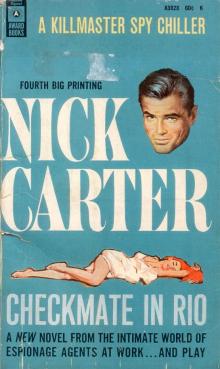 Checkmate in Rio
Checkmate in Rio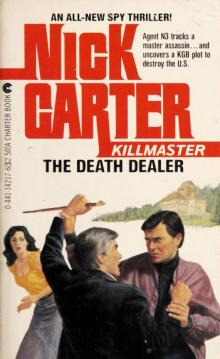 The Death Dealer
The Death Dealer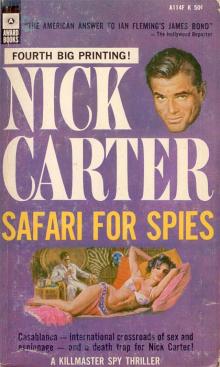 Safari for Spies
Safari for Spies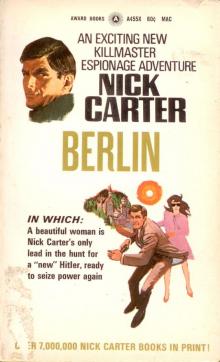 Berlin
Berlin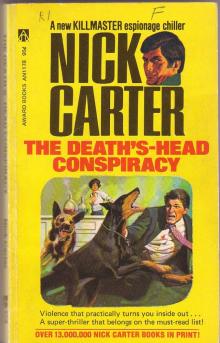 The Death’s Head Conspiracy
The Death’s Head Conspiracy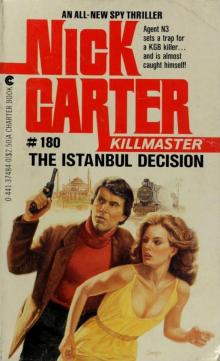 The Istanbul Decision
The Istanbul Decision The Liquidator
The Liquidator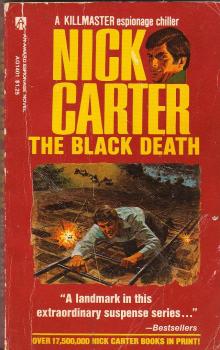 The Black Death
The Black Death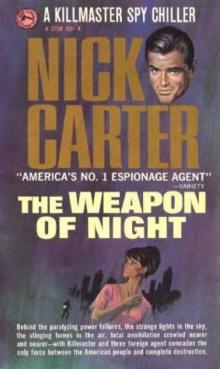 The Weapon of Night
The Weapon of Night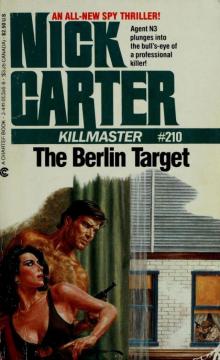 The Berlin Target
The Berlin Target Temple of Fear
Temple of Fear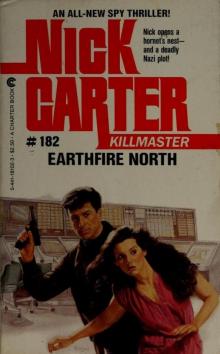 Earthfire North
Earthfire North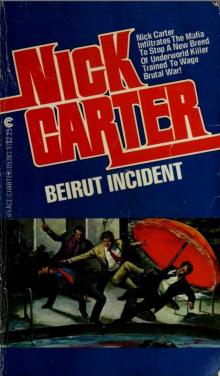 Beirut Incident
Beirut Incident White Death
White Death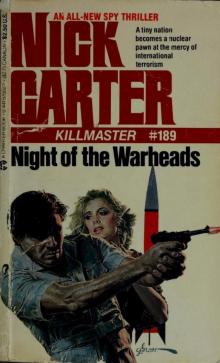 Night of the Warheads
Night of the Warheads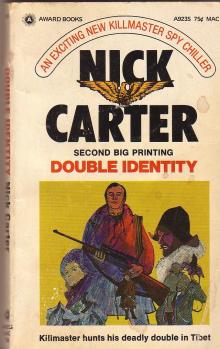 Double Identity
Double Identity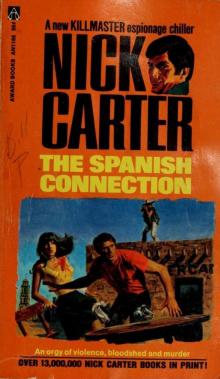 The Spanish Connection
The Spanish Connection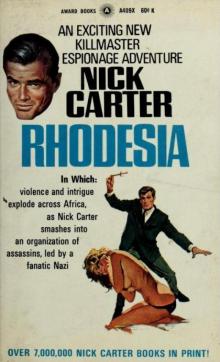 Rhodesia
Rhodesia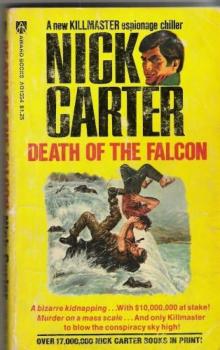 Death of the Falcon
Death of the Falcon The Executioners
The Executioners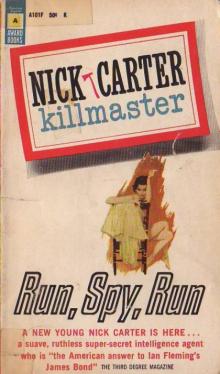 Run, Spy, Run
Run, Spy, Run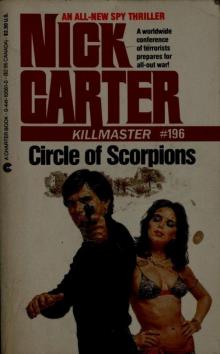 Circle of Scorpions
Circle of Scorpions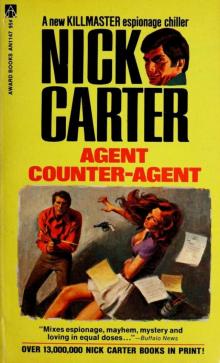 Agent Counter-Agent
Agent Counter-Agent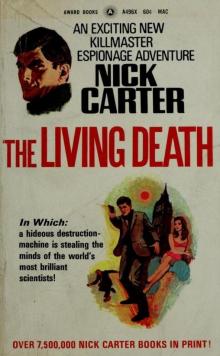 The Living Death
The Living Death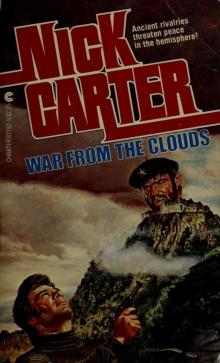 War From The Clouds
War From The Clouds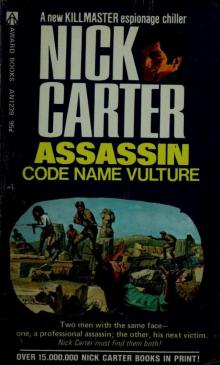 Assassin: Code Name Vulture
Assassin: Code Name Vulture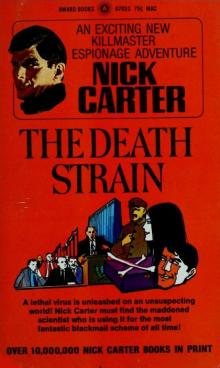 The Death Strain
The Death Strain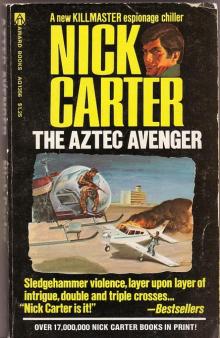 The Aztec Avenger
The Aztec Avenger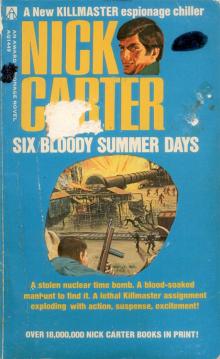 Six Bloody Summer Days
Six Bloody Summer Days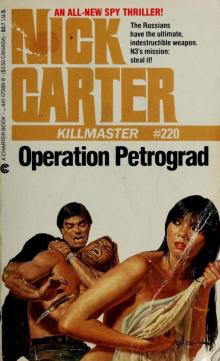 Operation Petrograd
Operation Petrograd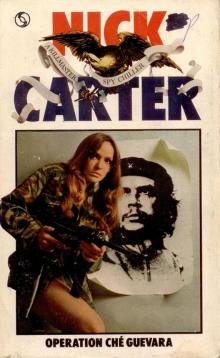 Operation Che Guevara
Operation Che Guevara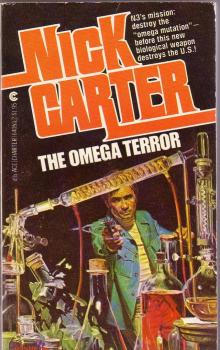 The Omega Terror
The Omega Terror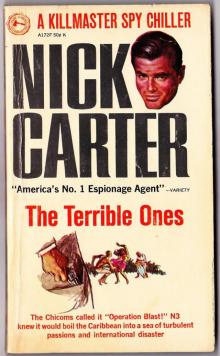 The Terrible Ones
The Terrible Ones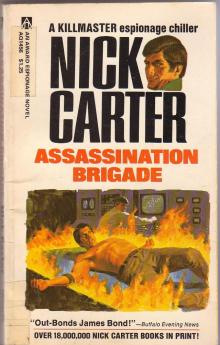 Assassination Brigade
Assassination Brigade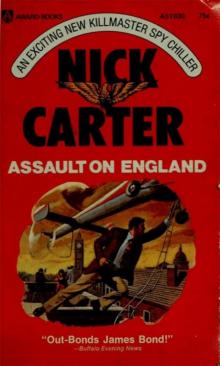 Assault on England
Assault on England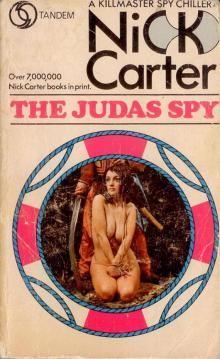 The Judas Spy
The Judas Spy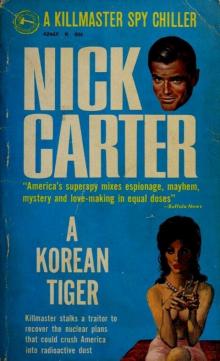 A Korean Tiger
A Korean Tiger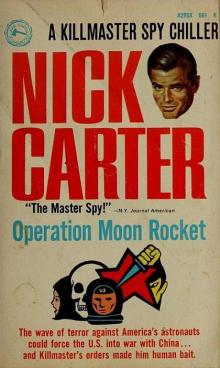 Operation Moon Rocket
Operation Moon Rocket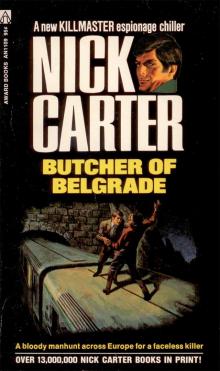 Butcher of Belgrade
Butcher of Belgrade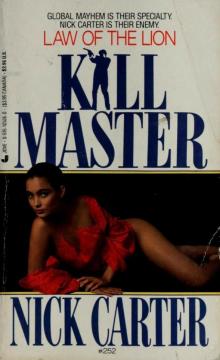 Law of the Lion
Law of the Lion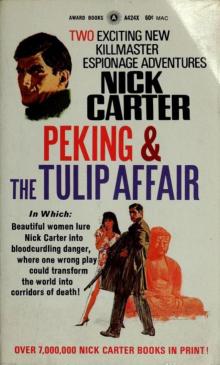 Peking & The Tulip Affair
Peking & The Tulip Affair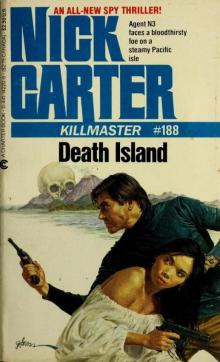 Death Island
Death Island The Jerusalem File
The Jerusalem File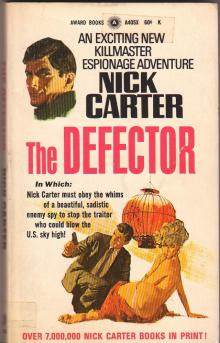 The Defector
The Defector The Fanatics of Al Asad
The Fanatics of Al Asad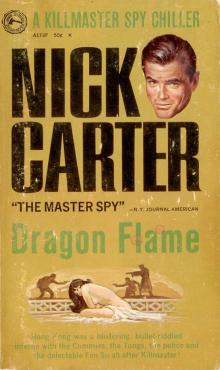 Dragon Flame
Dragon Flame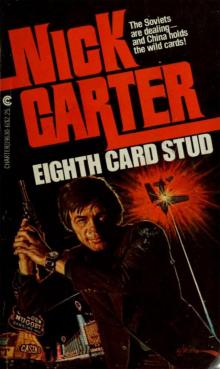 Eighth Card Stud
Eighth Card Stud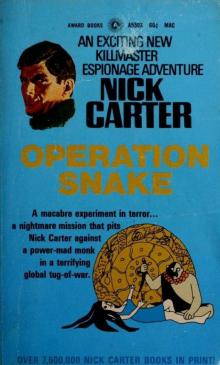 Operation Snake
Operation Snake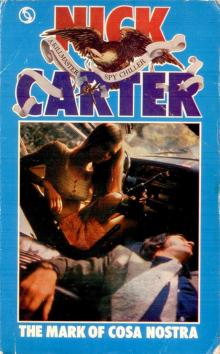 The Mark of Cosa Nostra
The Mark of Cosa Nostra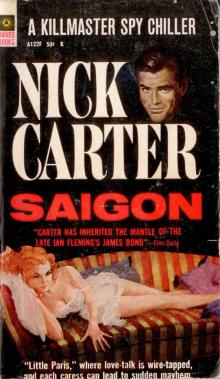 Saigon
Saigon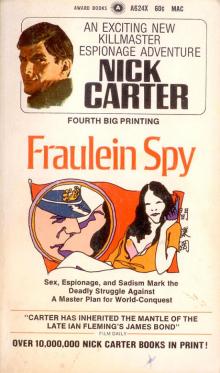 Fraulein Spy
Fraulein Spy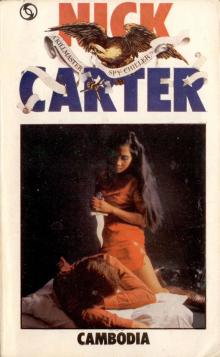 Cambodia
Cambodia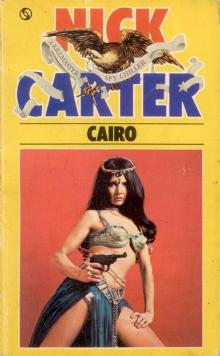 Cairo
Cairo